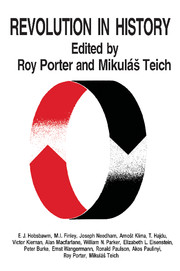Book contents
- Frontmatter
- Contents
- Notes on contributors
- Introduction
- 1 Revolution
- 2 Revolution in antiquity
- 3 Social devolution and revolution: Ta Thung and Thai Phing
- 4 The bourgeois revolution of 1848–9 in Central Europe
- 5 Socialist revolution in Central Europe, 1917–21
- 6 Imperialism and revolution
- 7 Socio-economic revolution in England and the origin of the modern world
- 8 Agrarian and industrial revolutions
- 9 On revolution and the printed word
- 10 Revolution in popular culture
- 11 Revolution in music – music in revolution
- 12 Revolution and the visual arts
- 13 Revolution and technology
- 14 The scientific revolution: a spoke in the wheel?
- 15 The scientific-technical revolution: an historical event in the twentieth century
- Index
11 - Revolution in music – music in revolution
Published online by Cambridge University Press: 05 February 2015
- Frontmatter
- Contents
- Notes on contributors
- Introduction
- 1 Revolution
- 2 Revolution in antiquity
- 3 Social devolution and revolution: Ta Thung and Thai Phing
- 4 The bourgeois revolution of 1848–9 in Central Europe
- 5 Socialist revolution in Central Europe, 1917–21
- 6 Imperialism and revolution
- 7 Socio-economic revolution in England and the origin of the modern world
- 8 Agrarian and industrial revolutions
- 9 On revolution and the printed word
- 10 Revolution in popular culture
- 11 Revolution in music – music in revolution
- 12 Revolution and the visual arts
- 13 Revolution and technology
- 14 The scientific revolution: a spoke in the wheel?
- 15 The scientific-technical revolution: an historical event in the twentieth century
- Index
Summary
REVOLUTION IN MUSIC
To speak about ‘revolution’ in connection with a topic like the history of music may appear far-fetched. But if we do so in connection with some important aspects of the history of music in the eighteenth century, we are doing no more than following the practice of some contemporary writers on musical matters. A book on the controversies aroused by Christoph Willibald Gluck with the operas he produced in Paris during the 1770s, appeared under the title Mémoires pour servir à l'histoire de la révolution operée dans la musique par M. Ie Chevalier Gluck.
There is in fact quite a lot to be said for this choice of phrase. For some of the more important eighteenth-century developments in musical form and taste can very usefully be considered as part of the social and intellectual transformation which began with what Paul Hazard has aptly called ‘the crisis of the European consciousness’ about 1680, and which culminated in the 1780s in the French Revolution.
The writer who did most to involve the arts in that process of transformation was the Third Earl of Shaftesbury. He was not a systematic thinker, which has led some historians of thought to underrate his importance. His main achievement was to restate the constructive and positive world view of the Neo-Platonists in terms which established this view as the ‘common sense’ of the period. In this way, his conception of nature as the embodiment and exemplar of a harmony, which it was both an aesthetic pleasure and a moral inspiration to perceive, became a profound influence on the arts throughout the eighteenth century.
In his Inquiry concerning Virtue, Shaftesbury contrasted human and animal behaviour:
In the … Species and Creatures around us, there is found generally an exact Proportionableness, Constancy and Regularity in all their Passions and Affections; no failure in the care of the Offspring, or of the Society, to which they are united … The smaller Creatures, who live as it were in Citys (as Bees and Ants) continue in the same Train and Harmony of Life: Nor are they ever false to those Affections, which move them to operate towards their Publick Good.
- Type
- Chapter
- Information
- Revolution in History , pp. 226 - 239Publisher: Cambridge University PressPrint publication year: 1986



